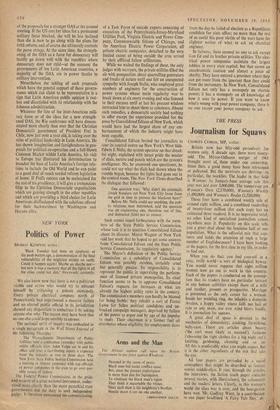NEW YORK
Politics of Power
MURRAY KEMPTON writes:
`Black Tuesday had been an epiphany of the push-button age, a demonstration of the final vulnerability of the mightiest society on earth. Could it happen again? Maybe so, maybe not— but now it was a memory that all the lights in all the cities could not dim.' Newsweek. currently.
We also know now that there is not a politician visible and active who would try to advance himself by criticising a private , monopoly. Every private electrical company north of Pennsylvania had experienced a massive failure and no- elected public official in its jurisdiction showed any disposition to embarrass it by asking anyone else why. The reason may have been that no one else could hope sensibly to answer.
The national spirit of inquiry was embodied in a single paragraph in the Wan Street Journal of the following Thursday : The Massachusetts Department of Public Utilities held a conference yesterday with public utility officials. Gov. John Volpe sat in and his office said later a fact-finding report is expected from the industry in two or three days. The New York. State Public Service Commission held a meeting in Albany yesterday with top officials of power companies in the state to go over pos- sible causes of failure.
The Federal Power Commission, in the pride and majesty of a great national instrument, under- stood more clearly than the more parochial state governments did the duty to seek independent judges. 11 therefore announced the commissioning
of a Task Force of outside experts consisting of executives of the Pennsylvania-Jersey-Maryland Utilities Pool, Virginia Electric and Power Com- pany, Commonwealth Edison of Chicago, and the American Electric Power Corporation, all private electric companies, detached to the very limited extent of being outside the area served by their afflicted fellow utilitarians.
While we waited the findings of these, the only judges with warrants, the private utilities filled the air with pomposities about quarrelling generators and freaks of nature until one felt an unexpected sympathy with Joseph Stalin, who employed great numbers of engineers for the construction of power systems whose main regularity was to break down at six every evening and who listened to their excuses until at last his peasant wisdom, instructed him to shoot them as saboteurs. Absent such remedies, a democratic society had nothing to offer except the experience provided for the press by Consolidated Edison of New York, which would have had the largest share of any em- barrassment of which the industry might have been capable.
Consolidated Edison invited the journalists to tour its control centre on New York's West Side. Edwin J. Nelis, the system operator on that dread- ful night, explained with intact pride the muster of dials, meters and panels which are the system's intelligence. No, he answered one questioner, he could not say what the dials had shown when the trouble began, because the lights had gone out in the control room. The New York Times described the dialogue that followed: One question was: 'Why didn't the automatic circuit breakers cut New York City loose from the grid in time to prevent the blackout here?'
Before Mr. Nelis could say anything, the pub- lic relations man intervened, said the question was an engineering one, therefore out of line, and instructed (him) not to answer.
Such scenes impel forbearance with the mem- bers of the State Public Service Commission, whose task it is to question Consolidated Edison about its disaster. Mayor Wagner of New York said last week that he hoped to get some answers from 'Consolidated Edison and the State Public Service Commission, its regulatory agency.'
The Mayor's definition of the Public Service Commission as a subsidiary of Consolidated Edison was possibly careless, certainly cruel but generally precise. Its responsibility is to represent the public in supervising the perform- ance of licensed private monopolies. Its chief function seems to be to approve Consolidated Edison's requests for increases in what arc already the highest utility rates in the country. The commission's members can hardly, be blamed for being feeble; they inhabit a sort of Forest Lawn for fallen political candidates and un- frocked campaign managers, deprived by 'failure of the power to argue and by age of the impulse to study. Their chairman is a former fuel oil distributor whose eligibility for employment dates from the day he failed of election as a Republican candidate for state office; no more than the rest of us could this poor victim of the wars have the slightest notion of what to ask an electrical engineer.
In fairness, there seemed no one to ask except Con Ed and its brother private utilities. The elec- trical power companies maintain the largest lobbies in every state capital; but that seems an anachronistic caution and almost a piece of charity. They have entered a province where they can get more from the ignorant than they could from the mercenary. In New York, Consolidated Edison not only has a monopoly on electric power; it has a monopoly on all knowledge of how it uses its power. If you want to know what's wrong with your power company, there is no one except your power company to ask.


































 Previous page
Previous page